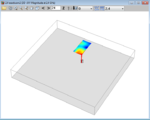nesan
Member level 2
- Joined
- Jan 20, 2015
- Messages
- 46
- Helped
- 1
- Reputation
- 2
- Reaction score
- 1
- Trophy points
- 8
- Location
- Tamil nadu,India
- Activity points
- 275
Follow along with the video below to see how to install our site as a web app on your home screen.
Note: This feature may not be available in some browsers.
nesan, as explained earlier: Only the expensive version Sonnet Professional can calculate the antenna gain from current density. The free Sonnet Lite can not do this.
The other parameters that you asked about can be plotted directly from the viewer.
us there any possibility to calculate gain manually using the values such as zin vswr s11 y11 z11
No, this is not possible.
Ok, I can do that.
here is my project file sir please see this and correct it with your experience in this field to make my antenna to produce 2.4 ghz results and post the results with gain and gerber file which i required for display in pcb as an antenna


No, I will not do all the work for you. As I told you, this is your student project and you need to learn by doing this yourself. I gave you tutorial links and antenna design is also described in the Sonnet manuals. Now it is your job to read this and create your design. Many students have done that before.
I calculated at the antenna gain for your antenna and it looks really bad. Then I looked closer at the antenna and it makes no sense. Your antenna is completely messed up. You have created a lossy capacitor to the absorbing top cover. Why is the air layer thickness above the patch 6.122e-5 mm instead of half wavelength?
And why is the feed at the edge, instead of centered? You have seen patch antenna shapes before in the tutorials, why do you ignore all that? Why do you waste the time of people who were willing to help you?
View attachment 114329View attachment 114328